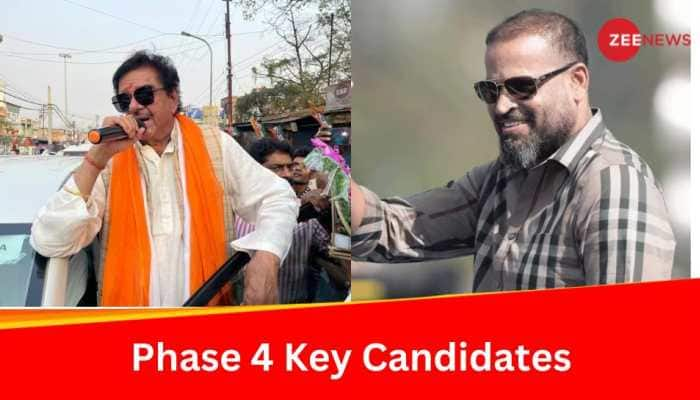Why Iran's Refusal To Support Pakistan On Kashmir Is A Big Win For India?
Iran's refusal to engage with the topic indicates Tehran's delicate balancing act as the Islamic nation pursues cordial relations with India
Trending Photos
)
Islamabad: In a big diplomatic win for India, Iran's decision not to support Pakistan on Kashmir has once again dashed Islamabad's hopes of getting international support on the highly vexed issue. Amid heightened tensions in the Middle East region, particularly with Israel, Iranian President Ebrahim Raisi's ongoing visit to Pakistan also comes as a gentle reminder of shifting geopolitical alliances and the need to strengthen ties with time-tested allies like India. Iranian President Ebrahim Raisi's three-day visit to Pakistan comes at a time when tensions remain high in the Middle East after Iran launched its retaliatory attack against Israel this month. According to Pakistan's Foreign Office, the Iranian President is visiting the country to ''mend the strained ties'' months after both sides launched airstrikes against alleged terrorist hideouts on rival lands.
Red Carpet Welcome For Raisi In Pakistan
Upon his arrival in Pakistan, Raisi was received by Federal Minister for Housing and Works, Mian Riaz Hussain Pirzada and Pakistan's Ambassador to Iran, Ambassador Mudassir Tipu. The official statement issued by Pakistan's Foreign Office said that Raisi's visit would be the “first visit by any Head of State to Pakistan after the general elections in February 2024”. During his stay, President Raisi is scheduled to meet President Asif Ali Zardari, Prime Minister Shehbaz Sharif, Senate Chairman Syed Yusuf Raza Gillani and National Assembly Speaker Sardar Sadiq. The Iranian President and the Pakistani leadership will discuss regional and global developments and bilateral cooperation to combat the common threat of terrorism. The talks between the two sides will also focus on increasing the bilateral trade between the two Islamic neighbours. Interestingly, during his Pakistan visit, the Iranian President will also tour major cities including Lahore and Karachi and meet with the provincial leadership.
Why Does Iranain President's Pakistan Visit Holds Significance?
President Ebrahim Raisi's visit comes at a time when friction between Tehran and Tel Aviv has reached a flashpoint. Israel launched airstrikes against Iran's Isfahan province where there had been reports of explosions. This followed Iran's unprecedented drone and missile attacks against Israel last weekend. The retaliatory military strikes after an alleged Israeli attack on an Iranian diplomatic mission in Damascus have raised global concerns of a potential war.
Pakistan too has had high hopes with Raisi's visit, which aims at strengthening the ties between the two Islamic countries in the middle of the disturbances in the Middle East. Raisi and Pak PM Shareef will also discuss regional and global developments and bilateral cooperation to combat the common threat of terrorism. Importantly, Iran is also facing sanctions from the United States for launching a drone attack against Israel.
Though Pakistan and Iran enjoy strong bilateral ties anchored in history, culture and religion, Raisi's visit provides an important opportunity to further strengthen bilateral relations. It may be recalled that Raisi is visiting Pakistan months after the cordial ties between the two neighbours suffered a setback when Tehran shocked Islamabad by carrying out airstrikes against alleged militant hideouts in the restive Balochistan province in January.
Pakistan swiftly responded by using killer drones and rockets to carry out “precision military strikes” against what it called “terrorist hideouts” in Iran’s Siestan-Balochistan province, killing 9 people. However, the two sides acted fast to restrain tempers through diplomatic channels. Therefore, Raisi's visit is expected to further cement the bilateral ties.
Among other issues, the Iran-Pakistan gas pipeline also remains a major reason for Pakistan's tolerance of some key security issues with Iran. The pipeline was an old idea, but implementation began much later when Asif Ali Zardari was nearing the completion of his first term as president. Iran has built its part, but Pakistan is hesitant to proceed at its end, due to pressure from Saudi Arabia and the risk of debilitating US sanctions.
Iran's Refusal To Support Pakistan On Kashmir Issue
During their talks, Pakistan PM Shehbaz Sharif raked up the Kashmir issue, however, he failed to get the expected support from the Iranian president. Ebrahim Raisi, instead raised the Palestine issue outlining how Iran has continued to support those fighting against oppression. During the joint press conference, PM Shehbaz said, “I thank you (Raisi) and the people of Iran for raising your voice for Kashmir.” With this, the Pakistani Prime Minister tried to show that whoever is in power, Kashmir remains the main agenda for the Pakistanis.
In a big insult to Pakistan, the Iranian leader did not acknowledge the line taken by the Pakistani PM, Shehbaz Sharif on Kashmir and the abrogation of Article 370 by the Narendra Modi government in India. While Shehbaz intentionally raked up Kashmir, attempting to link the issue with Gaza and Palestine, no such mention was made by Raisi.
This stance is similar to the approach taken by Saudi Arabia which earlier this month appeared to back India’s stance on Jammu and Kashmir in a joint statement with Pakistan. It urged India and Pakistan to resolve their “outstanding issues” bilaterally. The two nations issued a joint statement after the meeting between Saudi Arabia’s Crown Prince Mohammed bin Salman Al Saud and Pakistan’s PM.
India continues to reject all actions and statements by Pakistan on matters that are completely internal to India. “There is a greater understanding among countries that Jammu and Kashmir is an integral part of India and that the matters related to it are internal to India,” the Ministry of External Affairs (MEA) has said.
Iran's Balancing Act On Kashmir
The Iranian President's refusal to engage with the topic indicates Tehran's delicate balancing act as it pursues cordial relations with India. This is underscored by recent talks between India and Iran on Palestine, besides diplomatic and trade ties. The Indian Embassy last year outlined that Iran and India ''share a long history of meaningful relations''. The two sides also acknowledged the growing bilateral relations and high-level visits between the two nations.
Importantly, Iranian Foreign Minister Hossein Amir-Abdollahian hosted his Indian counterpart S Jaishankar in Tehran. Their discussions covered the violence in Palestine, as well as bilateral and multilateral ties with BRICS nations. Since Iran has bilateral ties with both India and Pakistan, maintaining a neutral stance on Kashmir is crucial. Besides, India and Iran have also reached a final agreement on the Chabahar Project. The new long-term agreement will replace the original contract, valid for ten years and automatically extended. External Affairs Minister S Jaishankar during a two-day visit to Iran, discussed establishing a long-term cooperation framework and views on the International North-South Transport Corridor.







)
)
)
)
)
)
)
)
)
)
